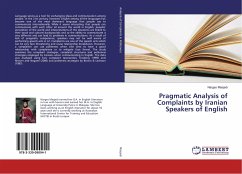
Chinese EFL Learners' Interlanguage Pragmatic Competence
Perspective of the Speech Act of Apology
Versandkostenfrei!
Versandfertig in 1-2 Wochen
13,99 €
inkl. MwSt.

PAYBACK Punkte
7 °P sammeln!
The book aims to investigate how Chinese English-majored students at college perform the speech act of apology so as to discuss the development of their pragmatic competence. The results from the quantitative analysis indicate that nearly all the subjects preferred to use the illocutionary force indicating device (IFID) strategy, which suggests that the IFID strategy is more universal whereas the other strategies are situation-specific. The Chinese EFL learners at the lower intermediate level did not differ much from those at the intermediate level, which suggests that language proficiency may...
The book aims to investigate how Chinese English-majored students at college perform the speech act of apology so as to discuss the development of their pragmatic competence. The results from the quantitative analysis indicate that nearly all the subjects preferred to use the illocutionary force indicating device (IFID) strategy, which suggests that the IFID strategy is more universal whereas the other strategies are situation-specific. The Chinese EFL learners at the lower intermediate level did not differ much from those at the intermediate level, which suggests that language proficiency may not determine the development of EFL learners' pragmatic competence. The study did not confirm a significant correlation between the social and contextual factors (i.e., social distance, social power and severity of offence) and the selection of most apology strategies. The results from the qualitative analysis show that there inevitably existed pragmalinguistic and sociopragmatic failures in the individual Chinese EFL learners' pragmatic behavior.












